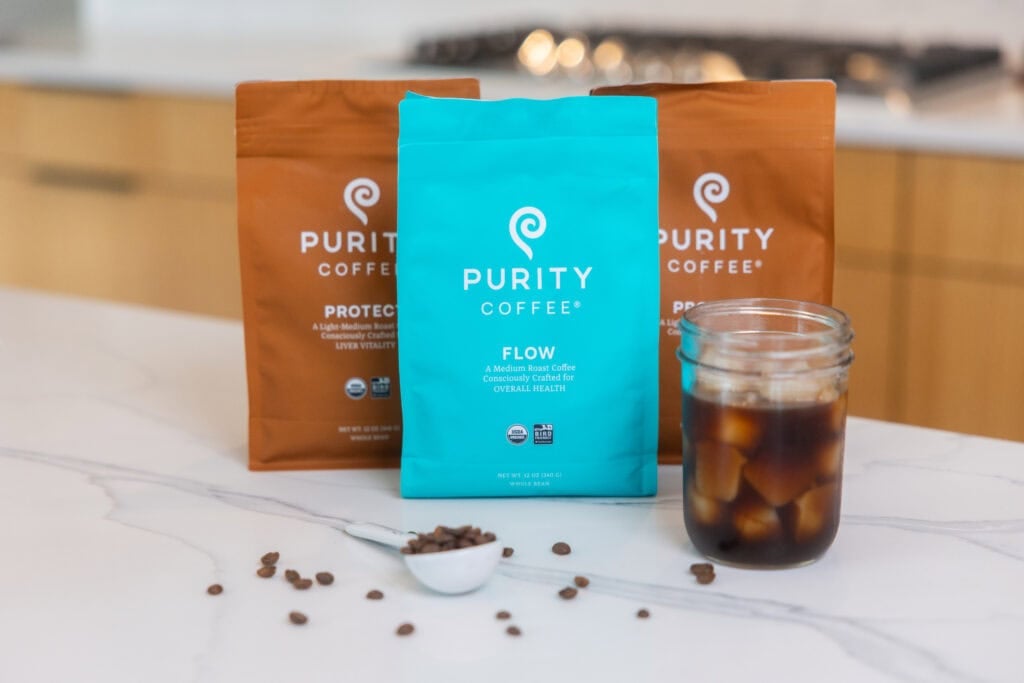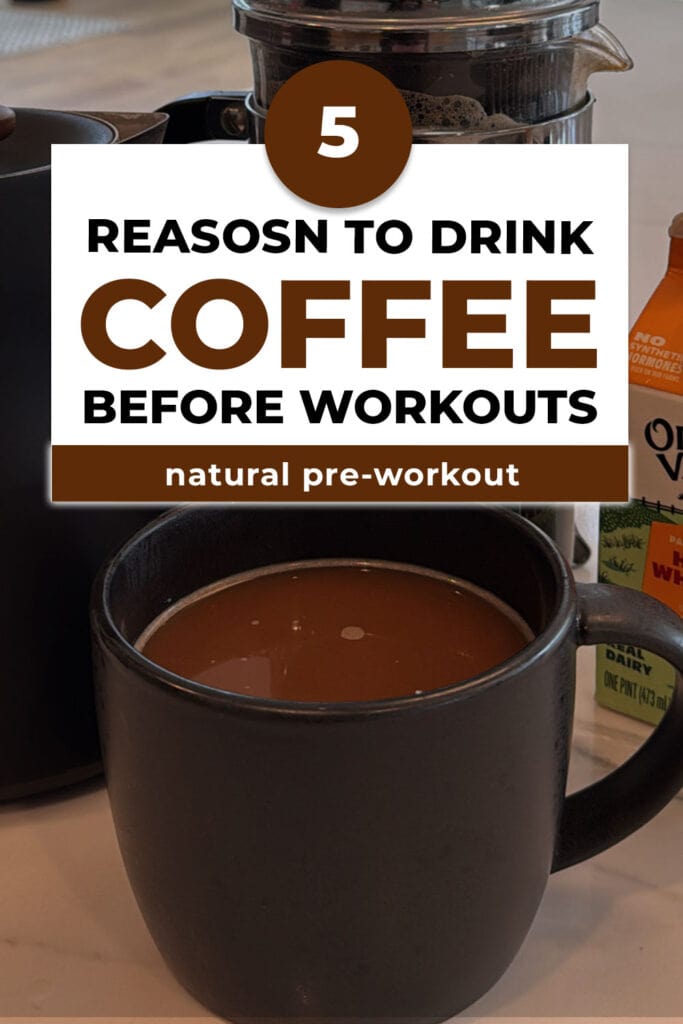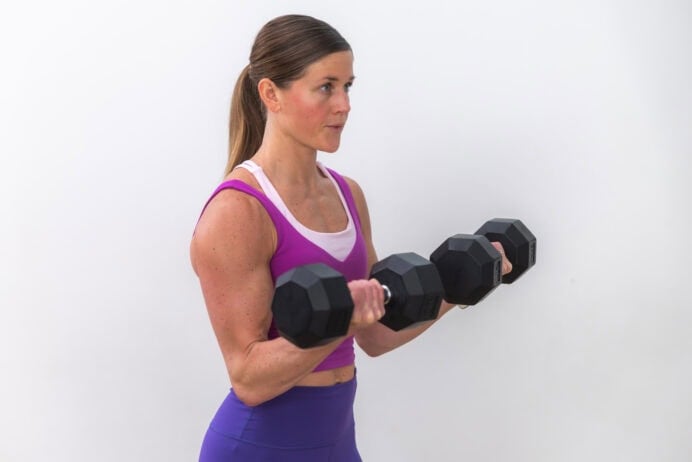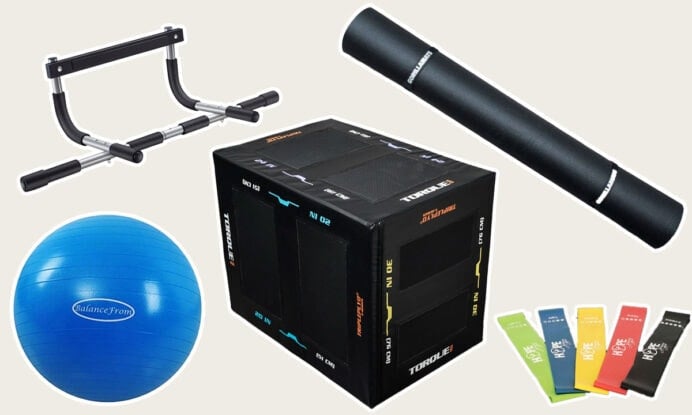
Should You Have Coffee Before or After a Workout?
Wondering if coffee before a workout helps or hurts? Using coffee as a pre-workout supplement can help boost strength, power and endurance during challenging workouts, but it’s not without side effects. In this guide, I’ll break down the benefits of caffeine, drawbacks and exact timing and dosage of coffee I use to optimize my performance during workouts.
Quick Links:
My morning cup of coffee is a small daily ritual I look forward to every single day. I used to stick to 1 cup a day, but I’ll be totally honest – as a busy mom of 3, my caffeine consumption has definitely gone up with each baby I’ve had!
Whether I’m lifting heavy weights or sweating it out during a conditioning workout, I’ve found that a pre-workout coffee helps me feel alert and boosts my energy levels without the crash of sugary pre-workout powders or energy drinks.
That said, caffeine affects people differently, and although it can increase alertness and athletic performance, it can also disrupt sleep or irritate your stomach if overused or mistimed.
If you’re also a coffee lover, you’ve probably wondered whether it’s better to have coffee before a workout or after. The research suggests there are benefits to both options, so I personally go by timing and how I feel: a cup 30-45 minutes before a workout helps my focus for mid-morning or early-afternoon sessions; if I’m exercising immediately after waking up, I save coffee for post-workout to avoid any stomach irritation.
the best coffee
PURITY COFFEE
⭐ Get a 20% discount on your first purchase with code: NML

Benefits of Drinking Coffee Before a Workout
Increased Energy and Endurance
Caffeine is one of the most-researched ergogenic aids (performance enhancers) in both cardio and strength training. Caffeine is a natural stimulant that works by blocking adenosine (a neurotransmitter that promotes drowsiness and sleep). This can help you push through challenging workouts.
In fact, research shows that consuming caffeine before a workout improves physical performance in a broad range of tasks, including muscular strength, power and aerobic endurance.
When I have coffee before a workout, I personally notice:
- Better stamina during cardio intervals
- Stronger last sets during heavy lifts
- Increased focus/motivation
Improved Focus
When caffeine suppresses adenosine, other neurotransmitters (like dopamine) increase, leading to improved alertness, quicker reaction times and increased performance.
Maintaining focus is especially important when you’re lifting heavy weights and training athletically. This allows you to maintain proper form, push through challenging sets and concentrate on contracting the targeted muscle during an exercise (the “mind-muscle connection”).
Not only does increased focus make your workouts more effective, but it also reduces your risk of injury by promoting safer training.
Can Help Reduce Feelings of Fatigue
Drinking coffee before your workout helps activate your central nervous system, which can reduce feelings of fatigue and perceived exertion in the short term. This can be especially helpful during early-morning workouts or long endurance sessions.
There’s also some research suggesting that consuming coffee after endurance training can increase muscle glycogen recovery, which refuels your muscles and helps prevent fatigue during future workouts.
In combination with recovery tools like rehydrating with electrolytes and mobility exercises, coffee can be part of an effective muscle-recovery routine.
Potential Metabolic Effects
There’s some research that indicates caffeine may promote weight loss and body fat reduction. Caffeine increases your body’s rate of fat oxidation (using fat for energy) and boosting your base metabolic rate (burning more calories). However, the research is limited and caffeine supplementation isn’t considered a fat-burning “magic pill” or shortcut.
That said, caffeine can be used as a tool to assist in sustainable, long-term habits we know supports healthy weight management, like strength training and getting in your daily steps.

Drawbacks and Considerations
Everyone experiences the effects of caffeine differently. Some people may experience more caffeine sensitivity, while others may have a higher caffeine tolerance. You might need to go through some trial and error before you find what works best for you. Although I personally enjoy coffee every day, there are some potential side effects of coffee consumption:
- Jitters/anxiety
- Increased heart rate
- Upset stomach/nausea/digestive issues
- Sleep disruption
To avoid side effects, try drinking coffee 45-60 minutes before your workout and/or limiting your consumption to 1-2 cups. Start low (50-100 mg) if you’re sensitive to caffeine and avoid fasted coffee if it upsets your stomach.
If you have any underlying health conditions or are pregnant or breastfeeding, you should check in with your doctor or healthcare provider before consuming caffeine before a workout.
Best Practices
- Timing of Coffee: 30-60 minutes before your workout.
- Dose of Caffeine: 3-6 milligrams per kilogram of body weight (~1-2 cups of coffee). Start at the low end and increase if needed.
- Type of Coffee: I recommend black coffee or coffee with a splash of cream over specialty lattes or fun coffeeshop drinks, which come loaded with milk and sugar and can lead to GI discomfort.
- Pairing: Consume with a small carb/protein snack to limit stomach upset or nausea from coffee on an empty stomach.
- Cutoff for Sleep: Stop caffeine 8-10 hours before bedtime. I personally avoid caffeine in the late afternoon and evening.
My simple pre-workout coffee routine is 8-12 oz coffee (black or with a splash of heavy cream) 30-40 minutes before training, plus a small snack (like a protein bar or banana) and 8-12 oz water. I find this is the sweet spot for increasing exercise performance without causing negative side effects for my body. If I train right after waking up, I wait to have my coffee until post-workout to avoid an upset stomach.

My Go-To Coffee
My perfect cup of coffee is simple, and so high-quality ingredients matter:
- Purity Coffee Flow Medium Roast
- Brewed coffee in a French Press (find all my coffee essentials on Amazon here!)
- Served with a splash of heavy cream
I use and love Purity Coffee (get 20% off your first purchase with code: NML) because it’s delicious, USDA organic certified and roasted to optimize antioxidants. It also goes through a rigorous third-party testing process to ensure the beans are free from pesticide residue, mold, mycotoxins, and other contaminants.
FAQs
Speciality coffees loaded with sugar and milk aren’t ideal before a workout because they can lead to stomach upset and hinder your fitness progress. To optimize performance, reach for a simple black coffee or coffee with a splash of milk or cream. You can also drink 1-2 shots of espresso to get the same amount of caffeine with less liquid volume if you find drinking a full cup of coffee before a workout difficult.
Yes. Coffee is a mild diuretic, but it still counts towards daily fluids. That said, hard training increases hydration and electrolyte needs, so I like to pair a pre-workout coffee with 16-24 oz of water or electrolytes during my workout.
Whether from coffee or other sources of caffeine, Mayo Clinic recommends most adults cap it at 400 mg of caffeine a day. That said, individual tolerance varies, and you may find your personal caffeine intake limits are higher or lower. Pay attention to potential side effects like anxiety, jitters or sleep disruptions. These are signs you may need to cut back.
Making the Right Wellness Decisions for You
If your body responds well to coffee before a workout, it can be a simple, cost-effective performance boost. If you experience negative side effects like anxiety, sleep disruption or stomach issues, try cutting back your serving size or saving your coffee for after your workout.
Coffee can be used as a tool to support your health and fitness goals – but consistency, nutrition, smart programming and recovery are the pillars of sustainable change and growth.
Fitness Info
Fitness EducationPin This: Should You Have Coffee Before a Workout?

This post includes affiliate links. I do earn a commission for products purchased using these links (at no additional cost to you). Thank you for supporting Nourish Move Love, making the content you see on this blog possible.


















